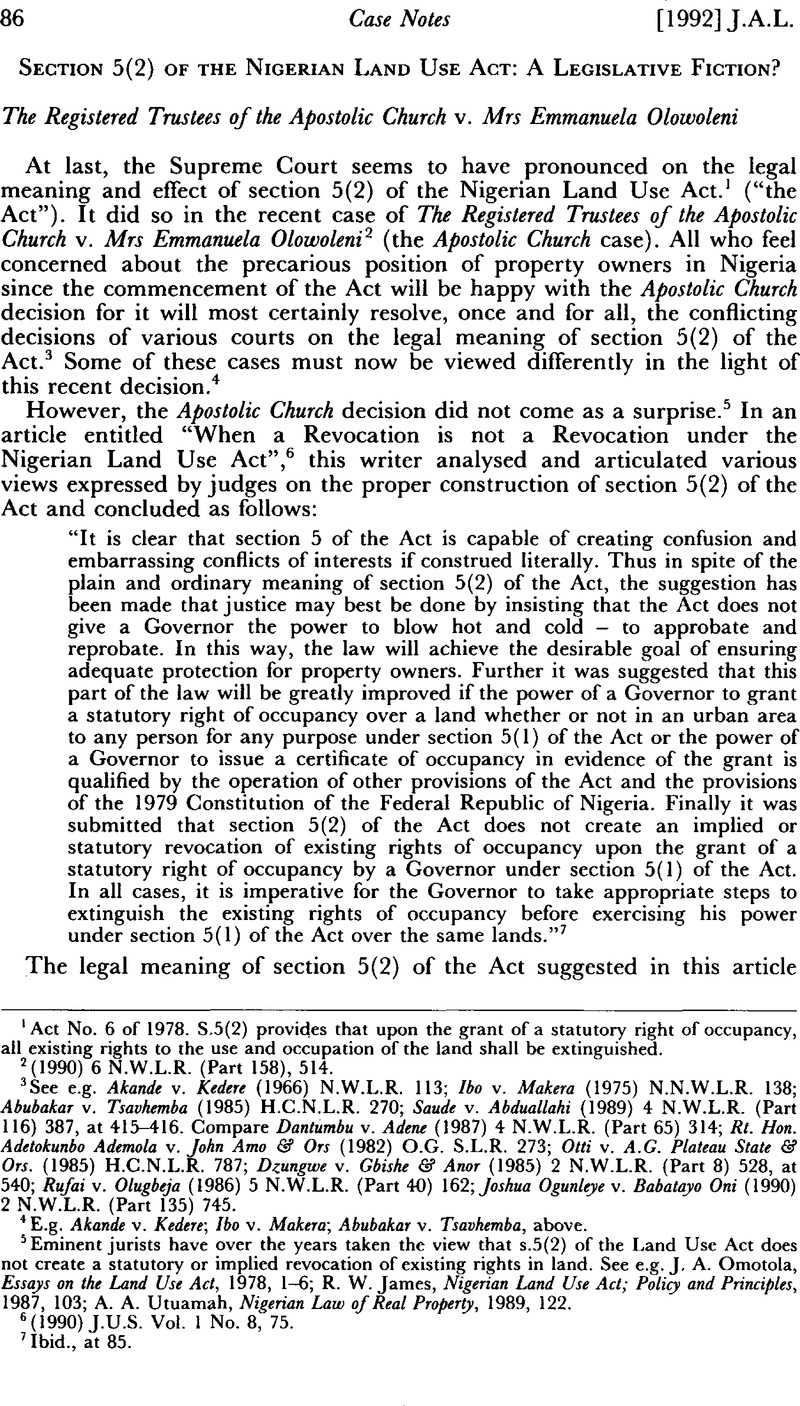No CrossRef data available.
Article contents
Section 5(2) of the Nigerian Land Use Act: A Legislative Fiction?
Published online by Cambridge University Press: 28 July 2009
Abstract

- Type
- Case Notes
- Information
- Copyright
- Copyright © School of Oriental and African Studies 1992
References
1 Act No. 6 of 1978. S.5(2) provides that upon the grant of a statutory right of occupancy, all existing rights to the use and occupation of the land shall be extinguished.
2 (1990) 6 N.W.L.R. (Part 158), 514.Google Scholar
3 See e.g. Akande v. Kedere (1966) N.W.L.R. 113Google Scholar; Ibo v. Makera (1975) N.N.W.L.R. 138Google Scholar; Abubakar v. Tsavhemba (1985) H.C.N.L.R. 270Google Scholar; Saude v. Abduallahi (1989) 4 N.W.L.R. (Part 116) 387, at 415–416Google Scholar. Compare Dantumbu v. Adene (1987) 4 N.W.L.R. (Part 65) 314Google Scholar; Rt. Hon. Adetokunbo Ademola v. John Amo & Ors (1982) O.G. S.L.R. 273Google Scholar; Otti v. A.G. Plateau State & Ors. (1985) H.C.N.L.R. 787Google Scholar; Dzungwe v. Gbishe & Anor (1985) 2 N.W.L.R. (Part 8) 528, at 540Google Scholar; Rufai v. Olugbeja (1986) 5 N.W.L.R. (Part 40) 162Google Scholar; Joshua Ogunleye v. Babatayo Oni (1990) 2 N.W.L.R. (Part 135) 745.Google Scholar
4 E.g. Akande v. Kedere; Ibo v. Makera; Abubakar v. Tsavhemba, above.
5 Eminent jurists have over the years taken the view that s.5(2) of the Land Use Act does not create a statutory or implied revocation of existing rights in land. See e.g. Omotola, J. A., Essays on the Land Use Act, 1978, 1–6Google Scholar; James, R. W., Nigerian Land Use Act; Policy and Principles, 1987, 103Google Scholar; Utuamah, A. A., Nigerian Law of Real Property, 1989, 122.Google Scholar
6 (1990) J.U.S. Vol. 1 No. 8, 75.Google Scholar
7 Ibid., at 85.
8 (1990) 6 N.W.L.R. (Part 158) 514, at 523 per Olatawura, J.S.C., delivering the leading judgment.Google Scholar
9 Ibid.
10 KWS/28/79 of 11 June, 1985; (1990) 6 N.W.L.R. (Part 158) 514, at 526, 531 and 533.Google Scholar
11 CA/K/51/86 of 3 December, 1986; (1990) 6 N.W.L.R. (Part 158) 514, at 526, 532 and 533.Google Scholar
12 S.20(1) of the Land Tenure Law just as s.15(a) of the Land Use Act provides in part that during the term of a statutory right of occupancy the holder shall have the sole right to and absolute possession of all the improvements on the land.
13 A combination of ss.6 and 10 of the Land Tenure Law empowers a Governor of any of the Northern States to issue a certificate of occupancy under his hand in evidence of a statutory right of occupancy.
14 Ss.5 and 9 of the Land Use Act are worded in terms similar to ss.6 and 10 of the Land Tenure Law.
15 Among other things, s.34 of the Land Tenure Law specifically directs that the revocation of a right of occupancy shall be signified under the hand of a public officer duly authorised in that behalf by the Minister and notice thereof shall be given to the holder; see s.34(5) thereof.
16 The provisions of s.28 of the Land Use Act are similar to those of s.34 of the Land Tenure Law except that under the Act the revocation can only be carried out on behalf of the Governor and not the Minister. Note that in this respect, the provisions of the Act prevail over those of Law: see ss.4 and 48 of the Act. And see Governor of Kaduna State v. Dada (1986) 4 N.W.L.R. (Part 38) 621Google Scholar; Sauda v. Abdullahi (1989) 4 N.W.L.R. (Part 116) 387Google Scholar and Makeri v. Kafinta (1990) 7 N.W.L.R. (Part 163) 411, at 420.Google Scholar
17 In this article entitled “When a Revocation is not a Revocation Under the Nigerian Land Use Act”, op cit., this writer argued forcefully that a Governor has an inherent power summarily to revoke or withdraw a right of occupancy or a certificate of occupancy granted or issued in error. See (1990) J.U.S. Vol. 1 No. 8, 75, at 83–84.Google Scholar
18 (1990) 6 N.W.L.R. (Part 158) 514, at 529.Google Scholar
19 (1990) 6 N.W.L.R. (Part 158) 514, at 529 per Olatawura, J.S.C.Google Scholar
20 (1990) 6 N.W.L.R. (Part 158) 514, at 536, per Nnaemeka-Agu, J.S.C. (emphasis mine).Google Scholar
21 (1989) 4 N.W.L.R. (Part 116) 387Google Scholar. In the instant case, Obaseki, J.S.C, expressed the opinion that s.5(2) of the Land Use Act (s.6(3) of the Land Tenure Law) creates a statutory revocation of all existing rights upon the grant of a statutory right of occupancy by a State Governor under s.5(l) of the Act (s.6(l) of the Law.).
22 (1990) 6 N.W.L.R. (Part 158) 514, at 531, per Obaseki, J.S.C. (emphasis mine).Google Scholar
23 (1966) N.N.L.R. 113.Google Scholar
23 (1975) N.N.L.R. 138.Google Scholar
25 (1985) H.C.N.L.R. 270.Google Scholar
26 Nigerian Courts have consistently taken this view. See e.g. L.S.D.P.C. v. Foreign Finance Corporation (1987) 1 N.W.L.R. (Part 50) 413Google Scholar; Obikoya v. Governor of Lagos State (1987) 1 N.W.L.R. (Part 50) 385Google Scholar; Majiyagbe v. A.G. (1957) N.N.L.R. 158Google Scholar; Nwosu v. Imo State S.A. (1990) 2 N.W.L.R. (Part 135) 677, at 724.Google Scholar
27 Obikoya v. Governor of Lagos State, above.
28 See above, n. 19. And see Nnaemeka-Agu, J.S.C., in The Registered Trustees of Apostolic Church v. Olowoleni (1990) 6 N.W.L.R. (Part 158) 514, at 536Google Scholar where the learned justice opined that the same principle applies in cases relating to land whether held under the Land Tenure Law or the Land Use Act.




